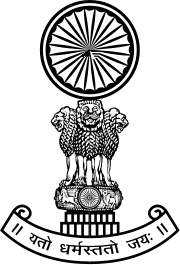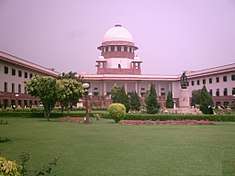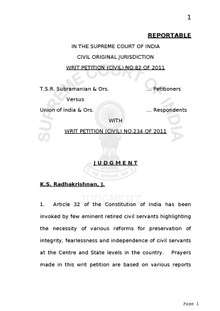T. S. R. Subramanian v. Union of India
| T. S .R. Subramanian v. Union of India | |
|---|---|
 | |
| Court | Supreme Court of India |
| Full case name | T. S. R. Subramanian & Ors. versus Union of India & Ors. |
| Decided | 31 October 2013 |
| Citation(s) |
W. P. (C) No. 82 of 2011 D. No. 4750-2011 |
| Legislation cited |
List
|
| Court membership | |
| Judge(s) sitting | K. S. Panicker Radhakrishnan, J and Pinaki Chandra Ghose, J |
| Case opinions | |
| Decision by | K. S. Panicker Radhakrishnan |
| Majority | K. S. Panicker Radhakrishnan, joined by Pinaki Chandra Ghose |
T. S. R. Subramanian & Ors. versus Union of India and Ors., an Indian public interest civil writ petition filed before the Supreme Court of India and decided in October 2013, is considered one of the landmark cases in Indian legal history.[1][2][3]
Premise

The case was filed as a public interest civil writ petition by T. S. R. Subramanian, retired Indian Administrative Service (IAS) officer and former Cabinet Secretary; T. S. Krishnamurthy, retired IAS officer and former Chief Election Commissioner; N. Gopalaswami, retired IAS officer and former Chief Election Commissioner; Abid Hussain, retired IAS officer and former Indian ambassador to the United States; Ved Prakash Marwah, retired Indian Police Service (IPS) officer and former Manipur governor; Joginder Singh, retired IPS officer and former director of the Central Bureau of Investigation, and 77 others in 2011.[1] It was heard by a division bench comprising justices K. S. Panicker Radhakrishnan and Pinaki Chandra Ghose from 2011 to 2013.[4][5]
The petitioners were retired top civil servants from—among others—the IAS and the IPS. They sought mandatory court injunctions to support the independence of the various Indian civil services and their freedom from political interference, by requiring the Indian federal and state governments to implement the recommendations made by several commissions of review (including the Hota Commission): that oral instructions given by politicians to civil servants must be recorded in writing, that senior civil service appointments should be made for a fixed term, and that civil services boards should be established to advise on postings. In addition, politicians in state government were seen to have been transferring civil servants repeatedly.[6][7][8][9]
Judgment

Major rulings in the case included:
- Officers of the IAS, other All India Services and other civil servants were not bound to follow oral directives, as they "undermine credibility".[2][10][11][12]
- Establishment of a Civil Services Board (CSB), headed by the Cabinet Secretary at the national level and chief secretaries at the state level, to recommend transfers and postings of All India Services (the IAS, the IFS and the IPS) officers.[1][13][14][15]
- Group 'B' officers would be transferred by heads of departments.[4][5]
- No interference of ministers, other than the chief minister, in transfers or postings of civil servants at the state level.[4][5]
Reaction
The supreme court decision received a mostly-positive reaction and was considered a "major reform".[1][2][12][16][17]
Indian Administrative Service Association secretary Sanjay Bhoosreddy said, "[w]e support the judgement. It vindicates our stand. It will help in good governance across the country".[3] According to Indian Forest Service Association president A. R. Chadha, the ruling would check arbitrary transfers and suspensions.[3] A Bharatiya Janata Party secretary-general Dharmendra Pradhan said that it would "help bring greater transparency in [sic] the system". Pradhan added that the "decision should not hamper government functioning, especially development work being carried out by the government".[3]
An Indian National Congress spokesperson P. C. Chacko disagreed: "[t]o discharge the responsibilities of the executive effectively, the power of transfer and posting of the officials should be with the government. For effective administration, the discretion should be with the political authority. Any infringement of this authority will not be good for the country,”.[3] The president of the Centre for Policy Research tweeted, "[o]n the face of it, supreme court is continuing its constitutional usurpation; and many orders are practically unworkable".[3]
References
- 1 2 3 4 Venkatesan, J. (October 31, 2018). "In major reform, SC orders fixed tenure for bureaucrats". The Hindu. New Delhi. ISSN 0971-751X. OCLC 13119119. Retrieved February 21, 2018.
- 1 2 3 Balaji, R. (October 31, 2013). "Chance to say 'No, minister'". The Telegraph. New Delhi. OCLC 271717941. Retrieved 8 September 2018.
- 1 2 3 4 5 6 Monalisa (October 31, 2013). "Supreme Court seeks to unshackle bureaucracy". Live Mint. New Delhi: HT Media Ltd. Retrieved February 21, 2018.
- 1 2 3 T. S. R. Subramanian & Ors. versus Union of India & Ors., W. P. (C) No. 82 of 2011 (Supreme Court of India). Text
- 1 2 3 "'The Civil Servants Cannot Function On The Basis Of Verbal Or Oral Instructions". Outlook. New Delhi. November 1, 2018. Retrieved February 21, 2018.
- ↑ Banik, Dan (June 1, 2001). "The transfer raj: Indian civil servants on the move". The European Journal of Development Research. 13 (1): 106–134. doi:10.1080/09578810108426783. ISSN 0957-8811. OCLC 55042966 – via Palgrave Macmillan.
- ↑ Saxena, Vaishali (2003). Bureaucracy on Wheels: Trauma of Transfers in the Indian Administrative Service. Jaipur: Aalekh Publishers. ISBN 978-8187359210. OCLC 191202280.
- ↑ "Haryana moves IAS officer Khemka again: 47th transfer in 25 years". Hindustan Times. Indo-Asian News Service. 8 April 2016. ISSN 0972-0243. OCLC 231696742. Retrieved 7 September 2018.
- ↑ Sehgal, Manjeet (12 April 2017). "Chandigarh: Haryana IAS officer Pradeep Kasni transferred for 68th time in 33 years". India Today. Chandigarh: Aroon Purie. ISSN 0254-8399. Retrieved 7 September 2018.
- ↑ Venkatesan, J. (November 1, 2013). "Oral instructions undermine accountability: Supreme Court". The Hindu. New Delhi: N. Ram. ISSN 0971-751X. OCLC 13119119. Retrieved 8 September 2018.
- ↑ Nagpal, Deepak (October 31, 2013). "IAS officers will no more act on oral orders: Supreme Court".
Zee News. New Delhi: Zee Media Corporation Limited. Retrieved 8 September 2018. templatestyles stripmarker in
|work=at position 1 (help) - 1 2 "Fix bureaucrats' tenure, free them from political influence: SC". Firstpost. New Delhi. November 1, 2013. Retrieved February 21, 2018.
- ↑ Jain, Bharti (31 January 2014). "2-year fixed postings for IAS, IPS and forest service". The Times of India. New Delhi: Bennett, Coleman & Co. Ltd. OCLC 23379369. Retrieved 8 September 2018.
- ↑ Chhibber, Maneesh (31 January 2014). "Centre notifies 2-yr tenure for IAS, IPS, Forest Service officers". The Indian Express. New Delhi: Indian Express Group. OCLC 70274541. Retrieved 8 September 2018.
- ↑ "Civil services board to oversee officers' postings". The Hindu. Special Correspondent. Thiruvananthapuram: N. Ram. May 1, 2014. ISSN 0971-751X. OCLC 13119119. Retrieved 8 September 2018.
- ↑ "SC seeks to protect civil servants from their political bosses". Business Standard. New Delhi: Business Standard Ltd. B. S. Reporter. November 1, 2013. OCLC 496280002. Retrieved February 21, 2018.
- ↑ "Year-end Special: 10 landmark judgments of 2013". Rediff.com. December 20, 2013. Retrieved February 21, 2018.
External links
| Wikisource has original text related to this article: |
- T. S. R. Subramanian & Ors. versus Union of India & Ors., W. P. (C) No. 82 of 2011 (Supreme Court of India). Text